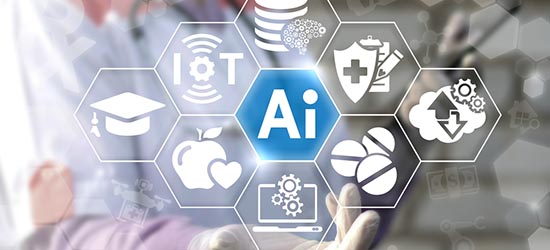The availability of vast amounts of health care data is driving the development of artificial intelligence (AI) applications that promise to improve the efficiency and effectiveness of patient care. AI health care applications are using data mining, machine learning and data analytics processes to assist doctors and health care providers in faster, more precise diagnosis and treatment.
copyright by www.marlinfinance.com
 The health care market for AI is expanding at a 40% growth rate and is expected to reach $6.6 billion by 2021. AI’s rapid growth is fueled by changes in health care delivery models, reimbursements and timelines. These changes are driving biomedical technology companies to create AI applications to help health care systems improve patient care and reduce costs.
The health care market for AI is expanding at a 40% growth rate and is expected to reach $6.6 billion by 2021. AI’s rapid growth is fueled by changes in health care delivery models, reimbursements and timelines. These changes are driving biomedical technology companies to create AI applications to help health care systems improve patient care and reduce costs.
Reading CT scans
One of the first AI applications in health care was to read CT, X-ray and other medical imaging scans for more accurate diagnoses. AI is ideal for streamlining repetitive work processes and managing large amounts of data. By linking AI tools with the expertise of trained clinicians, patient care in several medical disciplines can be improved through the delivery of faster, more precise reports and treatment plans. Experts predict AI will have a significant impact across the spectrum of health care in areas such as chronic disease management, patient engagement, clinical decision making, population health management and financial modeling. AI applications can optimize hospital workflows, improve decision making and reduce costs. Research firm Frost & Sullivan estimates that AI has the potential to improve patient outcomes by 30% to 40% while reducing treatment costs by up to 50%.
Making good use of patient data
AI applications are being used in the pharmaceutical industry to speed data search and analysis processes for drug research. Drug experience data can be combined with patients’ biological data to predict the effectiveness of drug therapies in particular populations with greater accuracy. The next wave of AI applications in health care may drive a new era of health care consumers. Big data can be drawn from multiple sources, such as medical records and wearable health trackers, and then manipulated and analyzed in new ways. New advances in natural language processing will ease the ability to interface directly with AI applications, allowing patients to take charge of their health care in a more meaningful way. […]
read more – copyright by www.marlinfinance.com


The availability of vast amounts of health care data is driving the development of artificial intelligence (AI) applications that promise to improve the efficiency and effectiveness of patient care. AI health care applications are using data mining, machine learning and data analytics processes to assist doctors and health care providers in faster, more precise diagnosis and treatment.
copyright by www.marlinfinance.com
Reading CT scans
One of the first AI applications in health care was to read CT, X-ray and other medical imaging scans for more accurate diagnoses. AI is ideal for streamlining repetitive work processes and managing large amounts of data. By linking AI tools with the expertise of trained clinicians, patient care in several medical disciplines can be improved through the delivery of faster, more precise reports and treatment plans. Experts predict AI will have a significant impact across the spectrum of health care in areas such as chronic disease management, patient engagement, clinical decision making, population health management and financial modeling. AI applications can optimize hospital workflows, improve decision making and reduce costs. Research firm Frost & Sullivan estimates that AI has the potential to improve patient outcomes by 30% to 40% while reducing treatment costs by up to 50%.
Making good use of patient data
AI applications are being used in the pharmaceutical industry to speed data search and analysis processes for drug research. Drug experience data can be combined with patients’ biological data to predict the effectiveness of drug therapies in particular populations with greater accuracy. The next wave of AI applications in health care may drive a new era of health care consumers. Big data can be drawn from multiple sources, such as medical records and wearable health trackers, and then manipulated and analyzed in new ways. New advances in natural language processing will ease the ability to interface directly with AI applications, allowing patients to take charge of their health care in a more meaningful way. […]
read more – copyright by www.marlinfinance.com
Share this: